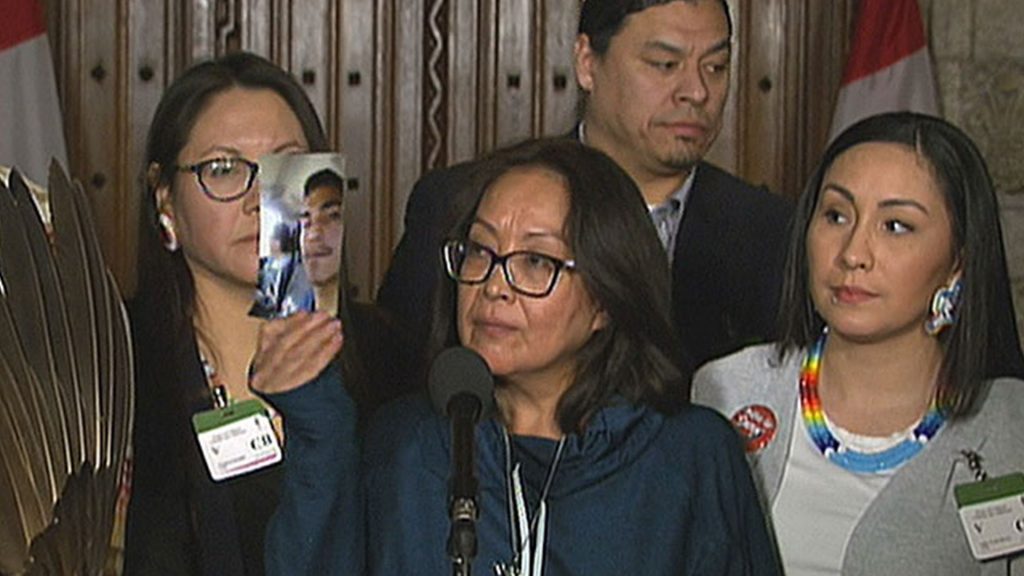
Lawyer Eleanore Sunchild (left) holds a photo of Colten Boushie with his family in Ottawa. APTN file
The Supreme Court of Canada has upheld the constitutionality of a key legislative change to the jury-selection process.
In a ruling from the bench today, the high court said scrapping so-called “peremptory challenges” amounted to a purely procedural change, one that applies retrospectively.
Peremptory challenges are a mechanism that allowed lawyers for either side to dismiss a certain number of prospective jurors without an explanation.
The Liberal government passed Bill C-75 in 2019 after an all-white jury acquitted Saskatchewan farmer Gerald Stanley of murdering Cree man Colten Boushie.
“Defence counsel challenged each and every one of the five Indigenous jurors,” Boushie family lawyer Chris Murphy told the high court while arguing in favour of abolishment.
Reasonable
“I submit that the reasonable observer of that jury selection process would have concluded one thing: that those five jurors were challenged solely because they were Indigenous.”
Eliminating the ability of lawyers to exclude jurors is ridding the trial process of “race-based discrimination,” Murphy added.
“(We) submit that neither the Crown nor the defence should ever in any circumstances be permitted to exclude jurors based solely on race.”
But defence lawyer Dirk Derstine, who filed the appeal, disagreed.
“This is not and cannot be an appeal of the question of (who killed) Colten Boushie,” he told the judges.
Emphasize
“…We should emphasize the dignity of allowing persons who have been historically the subject of that discrimination to be able to have the dignity to make their own decision about what the composition of what their jury will be.”
Stanley testified at his 2018 trial that his gun had gone off accidentally. He said he was firing to scare off some young people he thought were stealing from him after they drove onto his property.
Boushie, 22, was sitting in the driver’s seat of a Ford Escape when he was shot in the back of the head.
Public reaction to the acquittal was immediate and intense.
While some rural property owners, fed up with high crime rates, saw justice in the verdict – social media also lit up with rage and grief.
‘Do better’
Prime Minister Justin Trudeau tweeted that he empathized with the pain felt by Boushie’s family. Jody Wilson-Raybould, federal justice minister at the time, pledged that Canada “can and must do better.”
The next day, rallies were held from coast to coast. A protest camp set up on the lawn of the Saskatchewan legislature stayed there for more than six months.
Within two months of the verdict, the federal government brought forward the bill to abolish peremptory challenges.
Lawyers argued all sides of the debate Wednesday on behalf of clients who are black, Indigenous and people of colour.
They agreed racism was part of the justice system.
Too far
But groups like Aboriginal Legal Services and the British Columbia Civil Liberties Association (BCCLA) believed politicians went too far.
“Parliament cannot address this legitimate policy concern by abolishing the sole protection available to marginalized accused against implicit bias on the trial jury,” said BCCLA’s Joshua Sealy-Harrington said in trying to save the challenges.
“Myriad options are available such that our juries may be both impartial for the accused and free from discrimination against victims and jurors.”
In January, Ontario’s Court of Appeal unanimously affirmed the constitutionality of the decision to drop them.
However, the appeal court also found that anyone who chose to be tried by a jury before the new rules took effect in September 2019 was entitled to proceed with peremptory challenges, even if the trial begins after that date.
As a result, many jury trials that unfolded in the time between the implementation of the new rules and the appeal court’s ruling could have potentially been overturned.
The court said it would release written reasons at a later date.
With files from The Canadian Press









